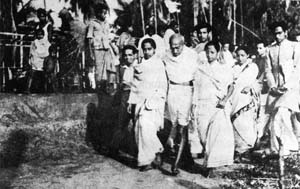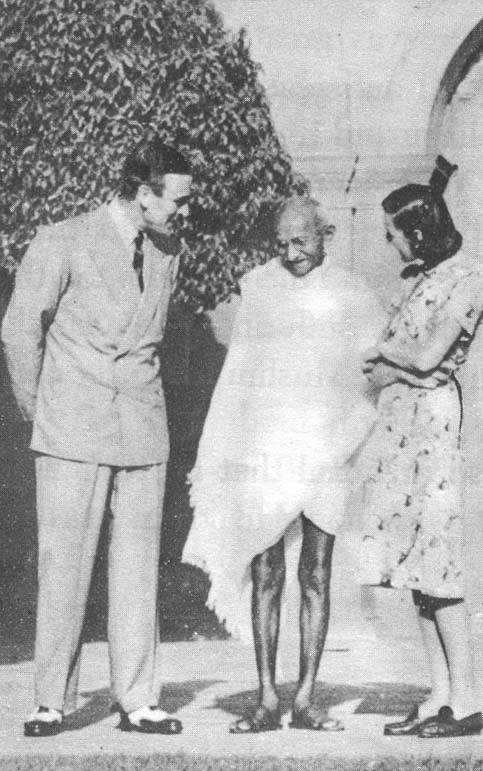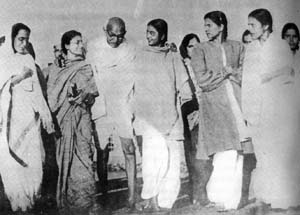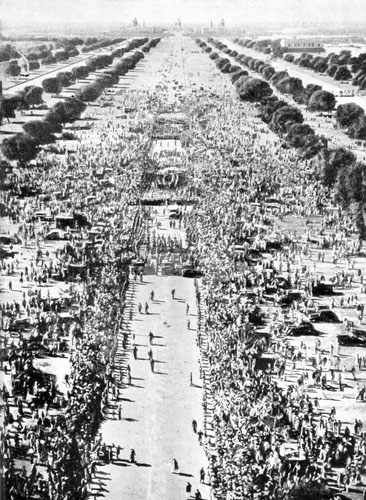

24. He Ram!!! |
On August 24, the Viceroy announced the formation of an interim National Government to replace the Viceroy's Executive Council. Jawaharlal Nehru was the Vice-President of the Interim Government. The Muslim league declined to join it on the ground that it had not been given the right to nominate all the Muslim members. After the installation of the interim Government Gandhi was anxious to return to Sevagram, his ashrama near Wardha, but the Congress leaders prevailed on him to stay longer in Delhi because they wanted his advice. So Gandhi stayed on in Delhi.  In Noakhali, 1946 Then the Muslim League decided to join the interim Government and an announcement was made to that effect on October 15, 1946. Gandhi once again felt free to return to Sevagram. He was about to leave Delhi when news came of disturbances in Bengal. There was widespread communal rioting by the Muslims in Calcutta and in the Muslim majority district of Noakhali in East Bengal, with murder, arson, looting, forced conversions, forced marriages, and abduction. Gandhi was confused and grief-stricken. Instead of returning to Sevagram, he set out for Noakhali to try to bring peace there. The communal riots spread. There were similar riots in Bihar and the Punjab. Thousands were killed and thousands more were injured. Gandhi was greatly disheartened by these events. He tried to calm and reassure the people.  With Lord and Lady Mountbatten He walked from village to village and from house to house carrying his message of peace. Whenever he was there was peace, at least outwardly, but the general situation in India was worsening. Rioting spread from the towns to the went there to instil courage into the Muslim minority and to help them in their distress. The situation in India was so dreadful that the Congress leaders realized that the best way open to them was to accept Jinnah's demand for division of the country, and they reluctantly approved the formation of Pakistan. Nehru met Gandhi to inform him of this decision. Gandhi asked him, 'Is there no way out? No hope of a united India?' Nehru was sad and grave. 'Bapuji,' he replied, 'unity is impossible. Dreadful as is the idea of a separate country within our borders, we have to accept it. Otherwise this deadly turmoil will never cease.' Gandhi bowed his head to hide his despair. On June 3, 1947, Attlee, the British Prime Minister, announced the plan for partition. The Congress and the Muslim League accepted it. For Gandhi it was a spiritual tragedy. With infinite sadness he said, 'All India must accept Pakistan in loving resignation. We have no choice. Hindus must lead the way to a friendly settlement.' Lord Mountbatten, the last British Viceroy, was anxious not to delay, the ushering in of independent India and independent Pakistan. He shortened the time limit for the British to quit India. The date for the declaration of Indian independence was fixed for August 15, 1947. Thus on August 15, 1947, India's long struggle and suffering for freedom was over. A new nation although split in two was born. Lord Mountbatten hailed Gandhi as 'the architect of India's freedom through non-violence'. Gandhi had never given his approval to partition, but when it was done he accepted it and did everything possible for the attainment of Hindus-Muslim friendship. Yet the tension between Hindus and Muslims continued to increase.  Walking to the prayer-meeting on 29 January 1948 As a result of partition over seven hundred thousand Hindus, Sikhs, and other non-Muslims in Pakistan, fearing the Muslims, left their homes and other non-Muslims in Pakistan, fearing India. From India about the same number of Muslims, fearing the Hindus left their homes for Pakistan. The miseries attendant on this mass migration, one of the greatest in history, were manifold. Fifteen hundred thousand people on the move were exposed to starvation, disease, and massacre on the way. Gandhi was on his way to the Punjab when he stopped in Delhi, hoping to quell the riots that had broken out there out there. He was very distressed at the inhuman way the Delhi Hindus were treating the Muslims. Gandhi's gospel of forbearance and forgiveness towards Muslims marked him as a traitor in the eyes of many Hindu extremists. In the face of fanatical oppositions, Gandhi redoubled his efforts and the major disturbances in Delhi subsided, but there were still disturbances here and there. Gandhi decided to do penance by fasting, which he thought would bring about a change in the attitude of the Hindus fanatics. The fast began on January 13, 1948. There was gloom all over India at the news of Gandhi's fast. People thought that he would not be able to survive another fast. The whole world not be able to survive another fast. The whole world watched as Gandhi, seventy-eight years old, fasted to save his country from destruction. On January 18 a peace committee, representing all communities, met and signed a pact pledging unity and the protection of life, property, and faith to the Muslim minority. Gandhi was informed of the pledge and he broke his fast. Gandhi was staying at Birla House. Every evening he held a prayer meeting in the grounds. During his prayer meeting on January20, a bomb was thrown at him, but it missed its target. Gandhi continued his prayer-meeting as if nothing had happened. 'Bapuji, a bomb exploded near you,' said a voice.  The funeral procession, 31 January 1948 'Really? Gandhi said. 'Perhaps some poor fanatic threw it. Let no one look down on him.' On January 30, after a midday nap, Gandhi woke up at 3.30p.m. The whole day he had a stream of visitors. Sardar Patel went to see him at 4 o'clock. Nehru and Azad were to come after the evening prayer. Gandhi left his room at 5 O'clock and went towards the prayer meeting. He passed through a cordoned off path, accompanied by Manu and Abha, his grand-daughters. As he was walking along a youth came forward as if to seek his blessings. But he stood in front of Gandhi and at point-blank range fired three shots in quick succession. All the bullets hit him. Gandhi fell, uttering the prayer, 'Rama, Rama.' Gandhi was dead. The assassination gave the world a tremendous shock. Nehru told the country of Gandhi's death, his voice chocked with emotion: 'Friend and comrades the right has gone out of our lives and there is darkness everywhere. I do not know what to tell you and how to say it. Our beloved leader, Bapu as we called him, the Father of the Nation, is no more. Perhaps I am wrong to say that. Nevertheless, we will not see him again as we have seen him for these many years. 'The light has gone out, I said and yet I was wrong. For the light that shone in this country was no ordinary light. The light that has illumined this country for these many years will illumined this country for many more years, and a thousand years later that light will still be seen in this country, and the world will see it and it will give solace to innumerable hearts. |